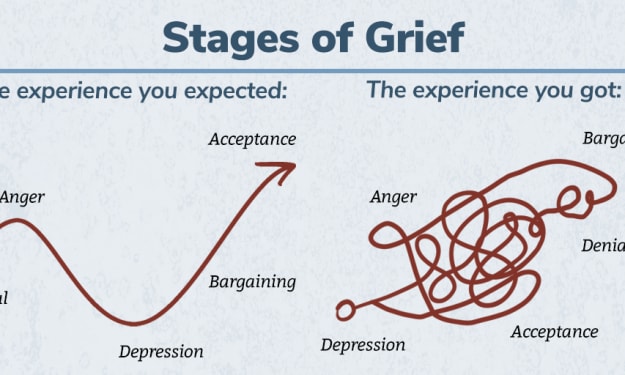I Failed at a Gaming Company
What I Did and What You Could Do Better

My name—my real name—is Iain O'Shea. You probably know me by my pen name, Patrick Lain. This isn't my usual content as in my description it says horror is my niche. I wanted to write this because before I was into trying to write all my life, I was an aspiring game developer. Keyword... was. Now, I will say I still love game development and design; it is something great and I encourage those who are interested in it to go forth and try it, but I encourage you to read this first and learn from my mistakes.
First: A Little Bit About Myself
At the time of writing this, I am a 19-year-old freshman in college. I decided to form my company back in my junior year of high school with the intention of it being just a small side thing with friends. I like to think I am a really motivated person, which is something I did right, but there is a difference between being motivated and being overly optimistic. I can admit now that I was—more like am—overly optimistic, which has its pros and cons. For me, I believed that creating a gaming company was my dream and at that time, it certainly was, but I put all my optimism towards that goal. I thought it was a sure thing.
What I want people to get out of that paragraph is that I was a really optimistic and focused person. I truly believed I had this whole thing down. I wouldn't call myself naïve, but I sure as hell didn't think enough about it. I was a boy with a dream, just like many of you reading this.
Choosing the People You Work with
As I said before, I started this "company" with my friends. That sounds, at first glance, like a great idea. You're working with people you trust, you get along, and you most likely aren't paying them. Even still, there are things that can go wrong with this.
First, how are they looking at this project? Ask them their motives for helping you. Are they doing it because you're friends? Do they hope to get something out of it? Are they bored, or are they actually motivated in the cause? I had fun with my friends at first, but when it got further into the process, a lot of them saw it as more work than play, which puts more stress on the team.
Secondly, what skills do they possess? As you can guess, it takes a lot to start a company—a gaming company, no less. Everyone needs a certain skill set or the ambition of learning said skills. Some people just want to be a part of a group and put in minimal effort, which is fine, just not for a company. In my case, I had a few people who were just along for the ride. They would listen in and talk sometimes but never actually put in the effort. Only a few of my people actually had programming knowledge when I first started, which made everything we were planning more hypothetical and theoretical than actually possible. Later on, in my first semester of college, I brought on some actual programmers which helped out a bit, but the problem was the time, which brings me to my third point in this section.
And third, how much time do your team members have? You might have skilled programmers and you might have motivated people, but do you, and almost more importantly, do they have the time? Time is an enemy to almost everything, especially a company. In the beginning, you think you have more time than you do. YOU probably have enough time because it's your ambition, but if your people can't make time, then you aren't going to get anywhere. I was in school when I was working on my project and I overestimated the time my team and I would have. I will say don't discourage, a lot of people have MORE time than they think and I'll get to that later.
The risks I took were calculated, but man, am I bad at math.
If you've seen that meme or picture with the painted bird, you'll probably recognize that quote. That saying basically metaphorically, and sometimes literally, summed up my experience in the later stages of progress. I got way too ahead of myself and thought I had a good, stable system in place. I thought I had great communication with my teammates, but in reality, it was hell to keep in contact with everyone; the more people, the more cluttered everything gets. Another thing I got wrong was funding. Funding is something that's always on the back of your mind and something you try not to think about all that much. It's not cheap to make a video game. Yes, some do it with minimal funds, but some funds will most likely be needed to speed the process up or to give it that push it was needing. In my case, I threw $200 straight into something I thought was going to help me. That was after I had already bought some resources that were necessary for the kind of game I was making. That $200 "help" I was looking for basically ended up being useless code, well not useless just not what we really needed; It was too advanced for us to use in a way. So I had bad communication and I had thrown a decent amount of money, for a college student that is, for what soon enough fell apart. With the hard time communicating, my team fell apart and ghosted each other, our main artist at that time was my girlfriend and after our breakup, we lost her. I had sunk $200 into something I thought would help, and to top it all off, I wrote a shitty business plan with the wrong calculations of what we would need (See literally calculated and still didn't get it).
"So what now?" Some may be asking. "You basically told us how you failed and I don't feel like trying something like this ever." I hope not many of you have that attitude, but if you do, the next part will hopefully help change your mind.
What You Can Do Right
After reading my journey and mistakes, it's time you learn from them so that you do better.
- Don't overestimate nor underestimate your time. You have time to work on your work. Never say you don't but at the same time. You don't have all the time in the world. Pace yourself.
- Don't rush. You're going to get really into it and want your project done sooner than later, but that doesn't give your project the quality it needs, and in some instances, rushing can stop the project altogether.
- Do industry research. No matter how much you game or write or anything, you still don't know the industry. As much as we want to say "Yeah I totally understand the gaming industry," we really don't unless we do the research. The truth isn't always what we think it is.
- Do, check, and compare your math. Money is important for a company or a project. It's not just free. I wish it was. What you need to do is calculate how much you'll need (can be done by seeing how much it takes to make a certain kind of game), create a budget, determine how you'll raise funds and record it all on an Excel spreadsheet or some kind of document. *Yes some projects can be done with minimal or no funds, but most likely that won't be the case*
- Pace your expectations. You won't finish a game in a month or even a year. Your team might not be as motivated as you, You might get distracted or something and all of that is okay. Start with small goals and work up, reward yourself and your team somehow with every goal you reach to keep motivation and morale up. Also, once you finish a game, don't expect it to be a big hit or make you famous. Just be happy you created something.
- Pick a team wisely. Yes, if you want, you can go by yourself and try and make one; but if you're like me, you'll get so stressed out you can't work. Find people who want to help out and believe in your vision. Maybe they won't be as motivated, but if they have some motivation, you can fuel it and create a great team.
- Be a leader, not a commander. You are the leader but that still means you need to do work. It might not be coding or art but it could be research, advertisements, treasury, or writing. You are a part of the team, you delegate the work, you can't do to people who can while you keep up your end of the bargain. Check up on them, keep them working, and be a leader. What you DON'T want to do is to expect them to do work when you don't, expect that you'll have the easiest job, expect them to make something that's exactly what you want the first time or at all. Everyone works differently, learn and remember that.
- See it as fun, not a chore. This is self-explanatory, but make sure you're enjoying the work and not just doing it for the hope of money or fame. This also applies to the team. Only join in if you want it to be fun not because you see it as a job.
- Ask for advice. You're not a god of your craft, even if you think you know everything... you don't and it's not a bad thing to ask for advice. If you're reading this portion you're already looking for help. Use the people around you, your peers, your family, adults in your life, make a Linkedin and check out other people in that industry, use the internet as a whole to help you. You're not alone.
- Control your impulses. You might see something as a good buy or something as very helpful and you'll go head first into it without thought...don't do that. Take a step back, look at the pros and cons, check your budget, see if you can find better or more affordable options. Plan before you do anything. This will save you money and resources, which is always better.
- Don't stress the little shits. This is actually a quote my father told back when I was in high school "Don't stress the little shits... and everything is a little shit." I put this in because it won't be smooth sailing for anyone, even if you have the perfect team it still won't go as planned. Even with that just don't stress about it, yes do your best to fix it but stressing over the little shits will ruin you. I probably could have succeeded if I didn't stress so much about the little things. See everything as a little shit because the little shits you can always get past.
And that's my story and tips for you. I wish you luck in your endeavor and I hope you do well. Use my failure to succeed and then everything I did would have been worth it to me.
Stay Taboo,
Patrick Lain
About the Creator
Patrick Lain
A Gothic, horror writer with a taste for the taboo, I also go into other genres but I have found my Niche in horror. Thank you for checking me out!
Stay Taboo, Be Unorthodox






Comments
There are no comments for this story
Be the first to respond and start the conversation.